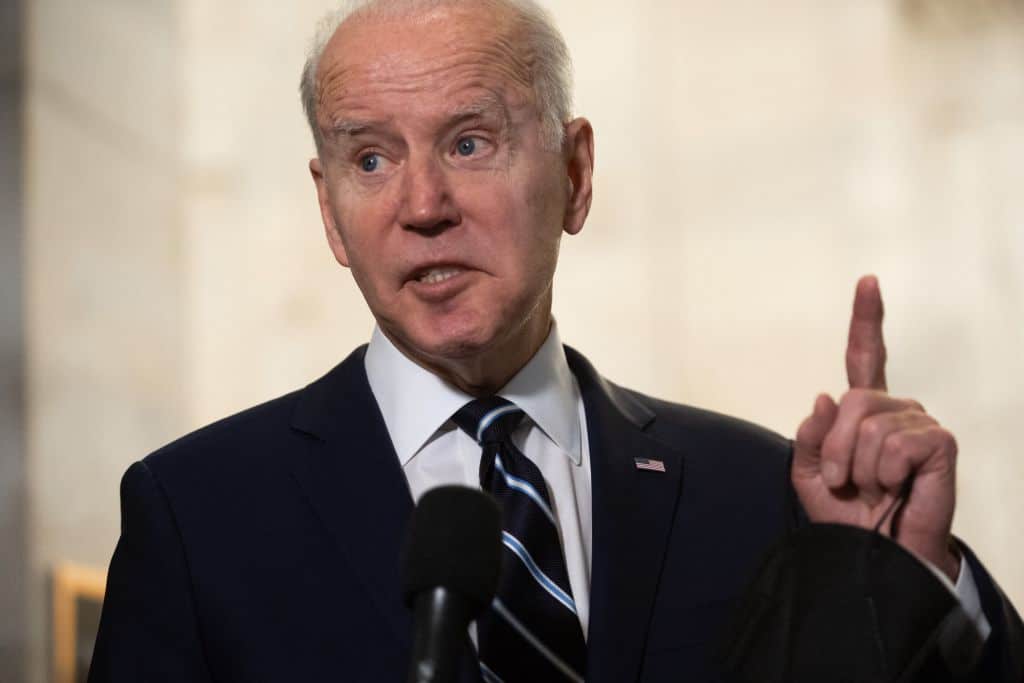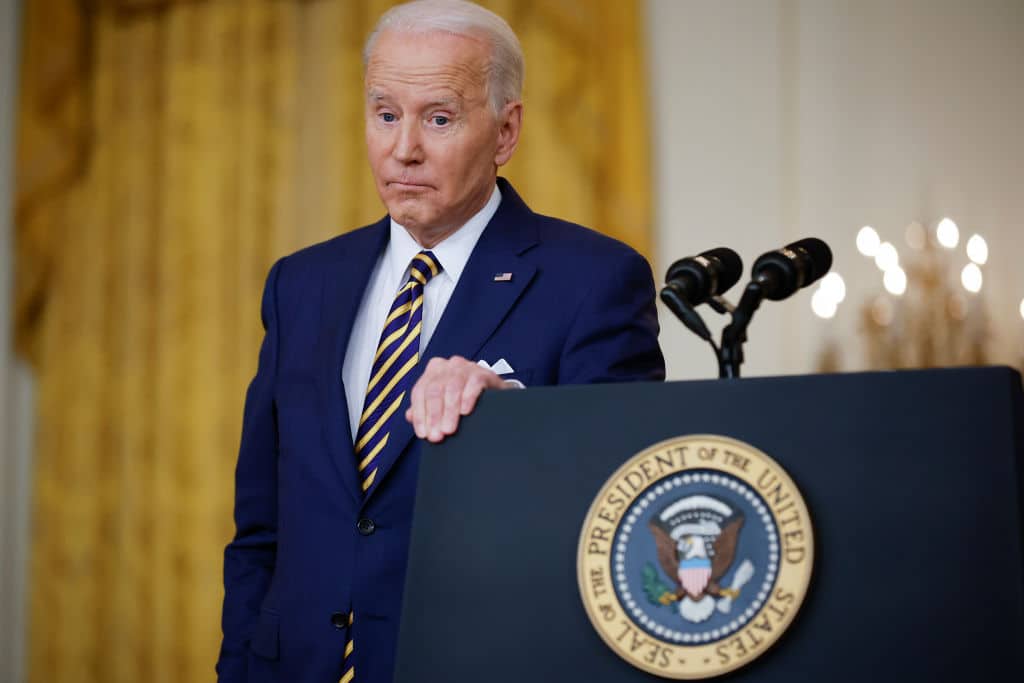Joe Biden. (Getty)
Joe Biden repeatedly vowed to get the Equality Act passed during his presidential run – but one year on from his inauguration, it is still languishing.
If passed, the Equality Act would revolutionise LGBT+ rights in the United States. The wide-reaching law would prohibit discrimination on the basis of sex, sexual orientation and gender identity in the areas of employment, housing, public accommodations, education, federally funded programs and other key arenas.
In short, the Equality Act has the power to make LGBT+ people equal under the law across all 50 states. Biden vowed to make it law within his first 100 days in office – which is why activists are so frustrated that it has stalled.
The legislation sailed through the House of Representatives in February 2021 with a majority of 224 to 206 – but things aren’t quite so simple in the Senate. The house is evenly divided between Republicans and Democrats, and to make matters worse, a three-fifths majority is needed to get a law through.

That means the support of 60 senators is needed to get the Equality Act passed – which is a tall order. In order to achieve that feat, Democrats would need the support of 10 Republicans to herald in a new era of LGBT+ equality.
The whole thing is complicated further by the Senate’s filibuster rules, which simply require a senator to submit a written notice of intent to filibuster to stop a law from progressing.
The Equality Act could be doomed unless Republicans offer their support
Years have passed since the modern iteration of the Equality Act was first presented – and LGBT+ people are growing frustrated by the lack of progress. Joe Biden made passing the Equality Act one of the pillars of his policy on LGBT+ rights during his campaign – but progress has stalled.
Not everybody holds Biden accountable for that failure – some activists have pointed out that the Equality Act was always doomed to languish in the Senate without adequate Republican support.
David Stacy is government affairs director at the Human Rights Campaign, one of the leading LGBT+ rights organisations in the United States. He says it’s a “legislative priority” for his organisation to get the Equality Act through the Senate – that’s why they’re trying to convince Republican senators to offer their support.
“The administration has been helpful in that regard and we expect that they will continue to be,” Stacy says. “Obviously it’s not entirely within their control because we will need 60 votes in the US Senate and we are working really hard on that. But the administration’s partnership on that effort, and obviously the leverage that the White House can bring to it, is a really critical part of that effort. We’re hoping to still try to get that done this year.
LGBTQ people and our allies should be flooding their senators’ phones and emails to demand they pass this critical piece of legislation.
“There are no guarantees, but we’re very much engaged in that process both on Capitol Hill but also out in the country where HRC is doing extensive field organising. We’ve just hired a whole series of temporary organisers to be working in these states to move the Republican votes that we need.”
Sarah Kate Ellis, president and CEO of GLAAD, agrees with Stacy’s assessment. She says there’s little Biden can do with the Equality Act until the Senate “takes action and passes it”.

“The inaction of the Senate is the problem here,” she says. “LGBTQ people and our allies should be flooding their senators’ phones and emails to demand they pass this critical piece of legislation. President Biden should continue to call for its passage and continue to demand the Senate reform the filibuster so that it can no longer be used to block progress that the American people want on protecting voting rights, reproductive rights and protecting every LGBTQ American from discrimination.”
Democrats and Republicans must work together to find a solution
Adam Polaski, communications director with Southern Equality, notes that LGBT+ people will continue to face discrimination in a number of key areas as long as the Equality Act remains stuck in the Senate. He says these issues are particularly pertinent for LGBT+ people living in southern states.
“We’re seeing lawmakers all across the South pass local protections – or, in Virginia’s case, state-wide protections – but it’s not enough: LGBTQ people should be free to travel from city to city and state to state without worrying that they’ll be denied access to healthcare, turned away from businesses, or harassed because of their sexual orientation or gender identity. We saw more than a dozen North Carolina municipalities – including the five largest cities – pass local protections in 2021. But what happens when folks leave that city or take a trip or visit family?
Your level of protection from discrimination shouldn’t sputter in and out like bad cell phone reception.
“Your level of protection from discrimination shouldn’t sputter in and out like bad cell phone reception – it should be uniform nationwide. The Equality Act would get the entire country on the same page, and it’s long overdue.”
Polaski points out that public support for the Equality Act is at an all time high – even among Republican voters. Still, he’s well aware that it’s a “challenging time to pass federal legislation”.
“We urge president Biden to prioritise passage of federal non-discrimination protections, working with Republicans and Democrats together to find a solution that can pass,” Polaski says. “He can do that by continuing to stump for the LGBTQ community, incorporate it into his public addresses, and devote serious resources and energy to this legislation.”

Polaski wants the Republicans who are blocking progress to know that securing better LGBT+ rights isn’t a “liberal or conservative” issue.
“It’s an issue that impacts all Americans,” he says. “There’s a reason that Republicans and Democrats agree on the whole that LGBTQ people should be protected from discrimination – because no one wants to see someone turned away or denied service or fired because of who they are. LGBTQ people exist in every family, in every city or town, in every community; one-third of LGBTQ Americans call the South home, and the quickest and clearest way for LGBTQ Southerners to secure full protections is through federal legislation.”
The Equality Act would ‘do at least some of what Biden has failed to do’ for LGBT+ Americans
Gavin Grimm is a prominent trans rights activist who so far has been left unimpressed by Biden’s term in office. He says the president has done “hardly anything meaningful” to improve LGBT+ people’s lives since he came into office – but passing the Equality Act could change things in subtle ways.
“The Equality Act would expand protection for LGBT+ Americans that so far have not been given to them by other means,” Grimm says. “It would be a strong tentpole against these hundreds of anti-trans bathroom and sports bills, it would redirect federal funds to support programs in the interest of the LGBT+ community. It would do at least some of what Biden has so far failed to do. It would be one of the many necessary steps in the right direction for LGBT+ people in America.”
One year into Biden’s term in office, the future of the Equality Act remains as uncertain as ever. It’s increasingly clear that the only way he can achieve his campaign promises to the LGBT+ community is by convincing Republican senators to offer their support.
Either that, or Senate reform is surely the only way forward.
